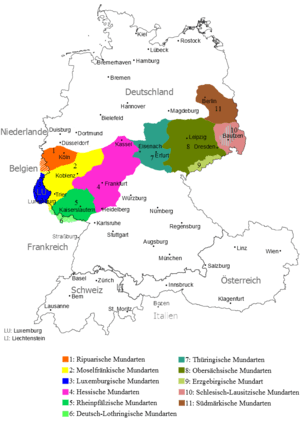Hessian dialects
Hessian (German: Hessisch) is a West Central German group of dialects of the German language in the central German state of Hesse. The dialect most similar to Hessian is Palatinate German (Ger.: Pfälzisch, pronounced [ˈp͡fɛlt͡sɪʃ]) of the Rhine Franconian sub-family. However, the Hessian dialects have some features which set them somewhat apart from other West-Central German dialects.
| Hessian | |
|---|---|
| Hessisch | |
| Native to | Germany |
Indo-European
| |
| Language codes | |
| ISO 639-3 | – |
| Glottolog | hess1238[1] |
 Central German dialects
(4): Hessian | |
Dialects
Hessian can be divided into four main dialects, namely those of:
- Northern Hesse (around the city of Kassel),
- Central Hesse (including the Marburg and Gießen areas),
- Eastern Hesse (around Fulda),
- Southern Hesse (around Darmstadt).
To understand this division, one must consider the history of Hesse and the fact that this state is the result of an administrative reform.[2]
The urban regiolect of Frankfurt and the Rhine-Main area is based on the Southern Hesse dialect. In the Central Hessian dialect area, the Frankfurt regiolect is gradually replacing the traditional local dialects.
Southern Hessian
Changes to consonants
Consonants are often softened, as outlined by Carsten Keil in his document "A Quick Guide to the Language of Frankfurt". For instance the German "Äpfel" (apples) becomes "Ebbel" in Hessian.[3]
See also
References
- Hammarström, Harald; Forkel, Robert; Haspelmath, Martin, eds. (2017). "Hessian". Glottolog 3.0. Jena, Germany: Max Planck Institute for the Science of Human History.
- The German Dialects, a practical approach Archived 2015-09-29 at the Wayback Machine, Wolfgang Näser, retrieved 19 July 2011
- A Quick Guide to the Language of Frankfurt, Carsten Keil, retrieved 19 July 2011
External links
- Hessian dialects (in German)